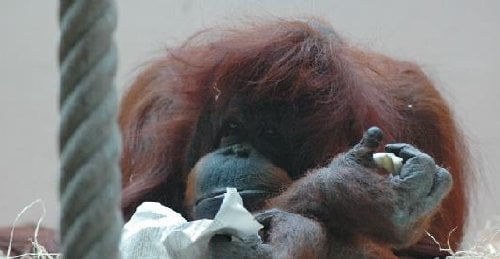Nénette

Born in the jungles of Borneo, a 40 year-old orangutan has spent the bulk of her life as the most popular inhabitant of the Jardin des Plantes in Paris. Director Nicolas Philibert ("To Be and To Have") observes the people who come to see her and the animal herself, "Nénette."
Laura's Review: B
Philibert is a documentarian who likes his subject to speak for itself. With "Nénette," he takes an unusual approach. As we learn that orangutans are one of earth's quietest creatures, Philibert rests his lens on Nénette (and also her son, who shares her enclosure, and a younger female with little ones in another one) while we listen to the disembodied voices, in multiple languages (the film is subtitled), of those who've come to visit her. Maybe the largely French patrons of the Jardin des Plantes have a more sophisticated view of animals or maybe Philibert chose his conversations specifically, but we do not hear the typical comments, projections of human behavior. He begins with a family whose little girl reads (presumably) the posted information which provides Nénette's history. One man notes Nénette's red hair and advises his companion that Egyptians used to murder red haired children before they were born. Old world travelogues are noted providing early reactions to the species. A caretaker talks about how difficult Nénette could be and how it took her six years to form a bond and change her mind. Another tells of her history of losing three of her four children and outliving three mates, suggesting she is lonely and bored. We're astonished to discover from the same woman that Nénette is on the pill because no one knows if orangutans would mate incestuously. She is also served tea daily. About thirteen minutes in, Philibert switches tactics, allowing us to see people from Nénette's point of view, beyond her own reflection in the glass which separates her from them. The echoey noise of excited visitors is raw and gives more the impression of an industrial space than a botanical garden. How has Nénette endured this for thirty-seven years? The documentary, which runs a scant 67 minutes, could perhaps have been trimmed more. Philibert only uses a lonely sounding horn a couple of times in the way of scoring, but one segment, set to a Russian(?) folk song, seems indulgent, its focus on the play of the little ones. He has it right at the onset, though, a long, close take of Nénette's eyes, then mouth, then hand. There is a world of experience within Nénette and watching her is both recognition of ourselves and a wondrous mystery.
Robin has not finished his review of this film.
Robin's Review: NYR
NYR

